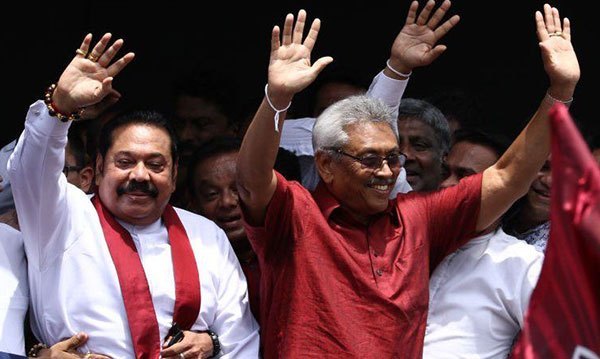The Appropriation Bill for the year 2021 was read in Parliament by Prime Minister Mahinda Rajapaksa today (17).
According to the Prime Minister, the Government’s estimated revenue Rs.1,961 million and expenditure Rs.3,525 million for the financial year of 2021. Expected economic growth rate for 2021 is 5.5%.
Below are some of the key points which were mentioned in the speech made by the Prime Minister:
– The simple tax system, introduced in the first half of 2020, will continue for the next five years.
– An additional amount of Rs. 2,500 will be allocated to ensure public safety.
– The World Bank, the Asian Development Bank and the Japan International Cooperation Agency are expected to lend $ 1,400 million annually over the next five years.
– Businesses earning more than Rs. 25 million per month will continue to be taxed 8% VAT.
– 7% special loan scheme for Samurdhi recipients.
– Rs. 750 million to be allocated for housing, health, education and entrepreneurship needs of retired, injured or deceased military servants through the Ranaviru Seva Authority.
– Five-year tax break for private educational institutions.
– An insurance scheme to be introduced for employees of private companies with more than 50 employees.
– Rs. 18,000 million additional allocation for COVID-19 control
– An additional allocation of Rs. 20,000 million will be made to the Armed Forces to cover basic needs including infrastructure.
– Additional funds of Rs. 3,000 million to initiate a scholarship program, to provide a Rs. 4,000 monthly allowance to students receiving vocational education, which will be based on their active participation.
– Permission for non-executive Government officials to engage in additional occupations after official hours of duty granted.
– Production of disposable polythene and plastic will be banned with effect from the 01 January 2021.
– Rs. 20,000 million to develop the infrastructural facilities to expedite the process of resolving pending cases in Courts.
– Electricity consumers assured a sustainable and renewable energy supply by 2023 with 70% of Sri Lanka’s energy supply being sourced from renewable energy sources.
– A 10 year tax relief on recycling sites for its investors.
– A contributory pension scheme introduced in 2013 for Sri Lankan foreign employees to be implemented.
– Manufacturing Train compartments to be developed as a local industry
– New city universities to be established in each district to cater to students pursuing popular subjects.
– A strong legal system for the archeological heritage management.
– Rs. 250 million to develop basic infrastructure of temples in rural areas.
– 45,000 employed in 126 countries to be repatriated due to Covid-19 risks.
– The daily wage of a plantation worker will be increased up to Rs. 1000.
– Rs. 150 million allocated for local fisheries development.
– In addition to the Lakvijaya Power Plant, a 300 Mega Watt Coal Power Plant and two 600 Mega Watt Natural Gas Power Plant to be constructed soon.
– Construction of the National expressway to be expedited. Colombo’s Marine Drive to be extended to Moratuwa.
– 25 Districts to be covered under a three year programme to develop road infrastructure.
– Railway network including Colombo and Kelani Valley to be expanded with a Rs. 1300 million investment.
– Banks will reduce the interest rate on home loans and housing loans made under advance funds for public servants to 7%.
– Rs. 5000 million allocated for the development of rural hospitals.
– Allocation of an additional allowance of Rs. 2 Billion for the development of Youth and Sport.
– Bilateral agreements to be reviewed, to ensure national security and the non-aligned stance of Sri Lanka.
– Companies Act No. 7 of 2007 to be amended further
– 25 year loan with an interest rate of 6.25% granted for applicants of State housing projects with the construction of 50,000 houses already underway under the Urban Development Authority.
– New, more stringent laws to be in place for monitoring of non bank financial institutions.
– Online tax collection system proposed.
– Special loan scheme for public servants to obtain solar powered electricity.
– Legal framework to be established for strengthening the financial sector, assist depositors and take action against failed institutions.
– Rs. 3000 million allocated in solution of a human-elephant conflict.
– Proposal to pay Rs. 2 for each dollar than the average exchange rate of money for foreign exchange sent to banks in Sri Lanka by foreign workers.
– Employees Provident Fund act to be amended to set the retirement age of both men and women to 60.
– Air Force surveillance to be strengthened to prevent deforestation
– Forest cover to be increased by 15,000 acres, Rs 3500 million allocated for reforestation programs until 2023 and drones to be utilized to monitor deforestation.
– Retirement age for both male and female employees of the state sector to be set at 60 years.
– Supermarkets, including Sathosa to be expanded in rural areas
– Provisions of Rs. 2500 million to be made for clay and brass wood carving villages
– Proposal to upgrade the College of Nursing as a degree awarding educational institution.
– Rs. 3,000 million allocated for waste management in Pradeshiya Sabhas in order to prevent the wildlife from being attracted to villages due to dumping of garbage in village boundaries close to wildlife.
– A loan scheme for students who successfully complete their vocational education to start a business through skills.
– Concessions to be provided for required taxes and specific goods trade, banking, and foreign exchange with the objective of converting the Port City Economic Zone as one of the hubs for investment promotions in the country.
– Rs. 3,000 million allocated for providing the required teachers and basic facilities to the rural schools, along with the 1,000 National School Development Program to be implemented at a grassroot level.-ceylontoday-
